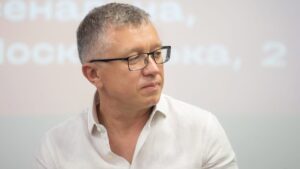
The National Bank of Ukraine (NBU) records cases of unlicensed activity in the market of non-banking financial services, in particular the exchange of cryptocurrencies for currency, transfer of funds and provision of loans and will strengthen its supervision over this.
“We are systematically working to limit any opportunities to use banking and payment infrastructure to serve the shadow sector of the economy(…) In the future we will intensify activities,” NBU head Andriy Pyshnyy said on his Facebook.
He stressed that detenization will contribute to the formation of a sustainable investment resource for the economy, and also reported the launch of a new area of work of the NBU – identification of unlicensed activities in the market of non-banking financial services and payment market.
“Unfortunately, we see that outside the legal framework of Ukraine and the appropriate supervision of the NBU citizens are offered services that have signs of financial: transfer and disbursement of funds, granting loans, exchange of crypto for currency”, – wrote Pyshnyy.
The head of the NBU noted that the goal is not only to identify unauthorized market participants, but also to return them to the legal field or initiate prosecution.
As reported, the National Bank continues to investigate the work of companies that may provide financial services without appropriate licenses, these are “Exchange24”, “X-Change”, “Liberty Finance” (“KYT GROUP”), “Tsarsky.io”, ‘FinMobile’ and “Trustee Plus”.

In January-June of this year, the mining and metallurgical group Metinvest, including its associated companies and joint ventures, transferred UAH 9.3 billion to budgets of all levels in Ukraine, compared with UAH 9.9 billion in the same period last year.
According to the company’s press release on Monday, the three largest payments were subsoil use fees, which amounted to UAH 2.5 billion, a single social contribution of UAH 1.7 billion, and UAH 1.6 billion in personal income tax.
In addition, Metinvest’s Ukrainian enterprises paid UAH 670 million in income tax and UAH 328 million in environmental tax in January-June 2025. Military tax for the first half of this year increased more than threefold compared to the same period in 2024, to UAH 472 million, and land tax increased by 5% to UAH 659 million.
“In times of war, paying taxes is our direct contribution to the protection and restoration of the country. After all, the financial responsibility of business is a source of strength for the army, medicine, education, and millions of Ukrainian families. We have learned to move forward even in the most difficult times — to work despite threats, to support the economy, and to help the front. We are keeping up the pace because we know that our resilience is part of our common victory,” said Yuriy Ryzhenkov, CEO of the group.
As previously reported, in 2024, Metinvest transferred UAH 19.8 billion in taxes and fees to budgets at all levels in Ukraine.
Metinvest is a vertically integrated group of mining and metallurgical enterprises. Its enterprises are located in Ukraine, in the Donetsk, Luhansk, Zaporizhia, and Dnipropetrovsk regions, as well as in the European Union, the United Kingdom, and the United States.
The main shareholders of the holding company are the SCM Group (71.24%) and Smart Holding (23.76%). Metinvest Holding LLC is the managing company of the Metinvest Group.

The National Bank of Ukraine (NBU) has added Insurance Broker Insurance Space LLC and On Time Insurance LLC to the Register of Insurance Intermediaries in accordance with submitted electronic applications. According to the NBU website, its committee for supervision and regulation of non-banking financial services markets made the relevant decision on August 1, 2025.
SB “Insurance Space” (Kiev) was registered in May 2025. The size of the authorized capital is UAH 5 th.
On Time Insurance LLC (Kyiv) was registered in June 2025. The size of the authorized capital – UAH 100 thousand.

The National Bank of Ukraine (NBU) has identified cases of unlicensed activity in the non-bank financial services market, in particular the exchange of cryptocurrencies for currency, money transfers, and the provision of loans, and will strengthen its supervision in this area.
“We are working systematically to limit any opportunities to use the banking and payment infrastructure to serve the shadow economy (…) We will intensify our activities in the future,” NBU Governor Andriy Pyshnyy said on his Facebook page.
He stressed that de-shadowing will contribute to the formation of a sustainable investment resource for the economy, and also announced the launch of a new area of work for the NBU – identifying unlicensed activities in the non-bank financial services and payment markets.
“Unfortunately, we see that outside the legal field of Ukraine and the relevant supervision of the NBU, citizens are being offered services that have the characteristics of financial services: transfer and issuance of funds, provision of loans, exchange of cryptocurrencies for currency,” Pyshny wrote.
The head of the NBU noted that the goal is not only to identify unauthorized market participants, but also to bring them back into the legal field or initiate legal proceedings against them.
As reported, the National Bank continues to investigate the activities of companies that may be providing financial services without the appropriate licenses, including Obmen24, X-Change, Liberty Finance (KIT GROUP), Tsarsky.io, FinMobile, and Trustee Plus.

Thanks to the creation of a marketplace with government bonds and more than 30 other instruments, as well as educational and advertising efforts, the Univer investment group opens about a thousand new securities accounts for clients every month, according to the group’s founder and president, Taras Kozak.
“I think that thanks to all our efforts, educational and promotional, we are now the leader in terms of the number of accounts opened: somewhere around a thousand new accounts per month,” he said in an interview with the Interfax-Ukraine news agency.
According to Kozak, the company currently has about 20,000 clients.
According to the Financial Market Contract Servicing Center (FMSC), as of August 1, there were 211,160 unique investors registered, with their number increasing by 13,370 since the beginning of this year.
“I cannot say exactly how much money, but it is many billions of hryvnia that have been invested in various financial instruments,” the investment banker added.
He specified that NovaPay is currently the largest partner, having introduced an alternative to deposits through repo transactions with its own bonds, which are administered by Univer.
At the same time, according to Kozak, in addition to NovaPay, the investment group offers its clients the largest selection of securities in Ukraine through its own app: in addition to 10 series of OVGZ, there are more than 30 other instruments.
“We are creating a marketplace where Ukrainians can buy OVGZ, funds, corporate bonds, and foreign securities that were introduced in Ukraine before the war, all in one place. When our clients want to sell, we list them in the cabinet, and our other clients buy them,” explained the president of Univer.
He emphasized that the investment group only allows instruments in which it is prepared to invest a portion of its portfolios to be listed in the cabinet.
According to him, Univer offers investors the opportunity to purchase securities from its own funds (Mykhailo Hrushevsky and Taras Shevchenko, which invest in Ukraine;
Yaroslav Mudry and Ataman, which invested in the S&P 500 and Nasdaq indices before the war, but now their investments are limited), as well as real estate and land funds.
As examples of real estate funds, he cited Andriy Zhurzhiy’s Inzhura funds and two Standard One funds, which are buying apartments in large income-generating buildings under construction near VDNH (S1 VDNH) and in Obolon (S1 Obolon). Kozak clarified that at the same time, the investment group does not engage in construction financing funds on principle.
“The third type of funds are land funds: Tvoe Kolo, Gruntovno, and the First Ukrainian Agrarian Fund. They purchase land on their balance sheet and then lease it out. The funds receive some dividends from rent payments, but the client is mainly interested in buying a piece of land for a small check of 100-200 thousand hryvnia,” the investment banker described the land funds.
He reminded that Univer’s own funds are open, while real estate and land funds are qualified with a minimum contribution requirement of 122,000 hryvnia.
Kozak noted that the investment group does not yet plan to create its own real estate and land funds, but is focused solely on managing its own funds, which invest in securities. At the same time, he pointed out that securities from competitors will be added to marketplaces and funds to expand the offering.
In his opinion, the benefit for the client is the convenience of having all reporting and financial instruments in one place to effectively manage them and transfer money from one asset to another.
Among other areas of activity of Univer, Kozak highlighted the registration or assistance in the creation of new financial instruments: bonds, funds, and a number of other instruments.
“In the case of bonds, we are probably the largest underwriter at the moment,” said the company’s CEO. As an example, he cited the issue of bonds backed by Novus for UAH 400 million and bonds of fintech company Activitis for UAH 300 million.
In addition, the asset management company Univer Management, which is part of the group, offers venture fund management for third-party businesses that are structured in this way, Kozak said.
“At times when there is no market, and such times are very common for us, unfortunately — in 2014, 2020, and 2022 — this allows us to survive,” he noted.

Sales of new passenger cars in Ukraine in July increased by 11% compared to the same month last year, reaching 6,700 units, which is also 8% more than in June 2025, according to Auto-Consulting.
Analysts note that sales in July could have been even higher, but this was hampered by difficulties with car registration in the last days of the month.
“But despite these obstacles, the results for July were very encouraging, as the car market has already moved into positive territory for the first seven months of the year, with growth of +0.84%,” the report said.
Auto-Consulting notes interesting changes among brands. Toyota retained first place, with sales up 3.5% to 918 units in June this year.
“For the first time in history, BYD took second place in the Ukrainian market, overtaking three competitors and pushing VW out of this position. BYD was preferred by 11% of Ukrainian consumers, which is a record among Chinese cars, and the BYD Song model also took second place among the most popular models,” Auto-Consulting reports.
Analysts note that neither Skoda nor Renault could withstand BYD’s relentless pressure, and most importantly, Volkswagen took three steps back, whose high performance is also maintained thanks to electric vehicle deliveries from China.
They also note the growing popularity of Honda, which moved up to sixth place from eighth in June with a 21.4% increase in sales to 323 units.
“BMW and Audi (8th and 9th place) slightly improved their positions, while another phenomenon of this year, Zeekr, lost some ground but remained in the top 10 of the Ukrainian car market,” the report says.
At the same time, analysts express surprise at the decline of Mercedes-Benz, which in July, as in June, ranked only 16th in the rating.
“Mercedes-Benz is no longer leading the premium car ranking in the Ukrainian market, nor is it even among the top three in the premium segment (BMW, Audi, Lexus),” analysts note.
Auto-Consulting believes that the trends observed in the car market in terms of brand positioning will continue until the end of the electric vehicle incentives, “and then it will be time for other forces to come into play.”
In turn, the Ukravtoprom association reported on Telegram that last month Ukrainians purchased more than 6,400 new passenger cars, 1% more than in July last year and 7% more than in June this year.
According to the association, the leading brand Toyota reduced its sales by 20% to July 2024, to 820 units, while BYD is rapidly catching up, improving last year’s result by 3.2 times, to 744 units, and jumping to second place in the ranking from ninth last year.
The top ten also includes Renault with 654 units (+11%); Skoda with 559 units (+48%); Volkswagen with 491 units (+47%); Honda with 319 units (+9%); Hyundai with 298 units (+32%); BMW with 263 units (-58%); Audi with 253 units (+20%); and Zeekr with 191 units (+125%).
“Since the beginning of the year, about 39,300 new passenger cars have been registered in the country, which is only 0.1% more than last year,” Ukravtoprom reports.
As reported, according to AUTO-Consulting, in 2024, sales of new passenger cars in Ukraine will grow by 9.8% compared to 2023, to 71,300 units, and according to Ukravtoprom, initial registrations will increase by 14%, to 69,600 units.